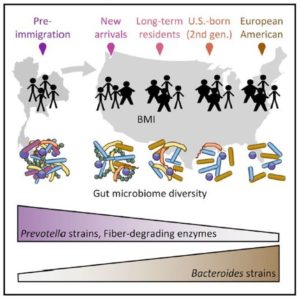Believe it or not, when we decide to move to another country, we are also changing the scenario for our own bacteria population. In this regard, a compelling new study published in the journal “Cell” suggests that migration between certain countries can profoundly affect the bacteria that live in our digestive systems.
Let’s try to explain it; the human gut is home to hundreds of different species of bacteria known collectively as the “gut microbiome”, with important implications for our health. As well as breaking down food, this community of microorganisms helps our bodies fight and prevent disease. There is even some evidence that the gut microbiome can influence our mental health.

But, how can this affect us? Well, a more diverse gut microbiome is associated with a healthier digestive system. And things that reduce this diversity, such as antibiotics, stress, or changes in diet can help make us more susceptible to conditions like obesity or irritable bowel disease.
The aforementioned study compared a total of 514 healthy women, split into those born and living in Thailand, those born in Southeast Asia who later moved to the United States (US), and those born in the US to immigrant parents originally from that continent. It found that changes to the gut microbiome began as soon as those immigrants arrived in America and continued to change over the decades.
The longer immigrants have spent living there, the more their microbiomes began to resemble those of native-born Americans of European ethnic origin. In fact, most participants living in America also gained weight during the course of the study.
On the other hand, diets directly influence the combination of microorganism species population so people from different parts of the world tend to have different bacteria. Western guts commonly contain lots of Bacteroides species, which are good at digesting animal fats and proteins. The guts of people with non-Western diets rich in plants tend to be dominated by Prevotella species, which are good at digesting plant fiber.
As a result, the new study revealed that strains of bacteria from the immigrants’ native countries, particularly Prevotella species, were completely lost, as were relevant enzymes for digesting important plant fibers. Studies that suggest that the microbiome can influence human health or disease are often challenged because it is hard to distinguish between cause and effect. Most of the knowledge in this area comes from studying laboratory mice.
Complementary studies from the lab of American biologist Jeff Gordon first found a link between obesity and the gut microbiome in 2006, when they showed mice gained weight when they were given gut bacteria from obese humans.
With immigration increasing and eating habits evolving, it is important we better understand how changes in populations, cultures, and diets can impact human microbiomes so that we can spot potential health problems.

